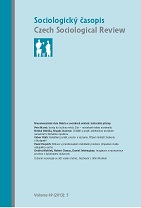Kolektivní paměť, prostor a významy. Případ náměstí Svobody v Budapešti
Collective Memory, Space and Meanings: Liberty Square in Budapest
Author(s): Gábor OláhSubject(s): Social Sciences
Published by: AV ČR - Akademie věd České republiky - Sociologický ústav
Keywords: collective memory; urban space; cultural sociology; meanings; iconicity
Summary/Abstract: When refl ecting on the relationship between urban space and collective memory, sociological discourses are challenged by cultural material objects like statues and memorials that, instead of consensus and unity, create conflict and a plurality of arguments. In this article the author examines the process of the formation of hidden cultural meanings and their influence on the action of carrier groups and the practices of remembering. He interprets the relationship between collective memory and urban space not as a constant one but as a dynamic process. A space is defined by the carrier group that uses it and the group is formed by a collective memory that is influenced by strong meanings. The case of the attack on Liberty Square and on the Memorial of Soviet heroes in Budapest is analysed by defining hidden meanings narrated by different carrier groups. The square is a space filled with strong and iconic meanings that are hidden beneath different layers of the past. The power of extraordinary events brings these meanings to the surface and creates conflict between different carrier groups.
Journal: Sociologický časopis / Czech Sociological Review
- Issue Year: 49/2013
- Issue No: 05
- Page Range: 729-750
- Page Count: 22
- Language: Czech

